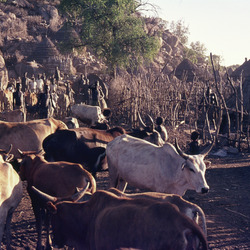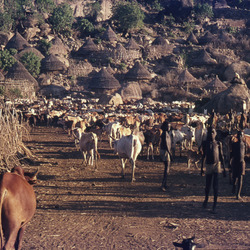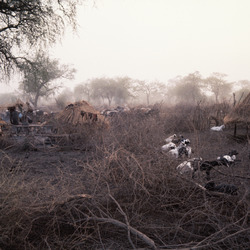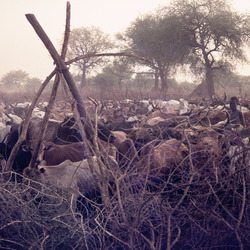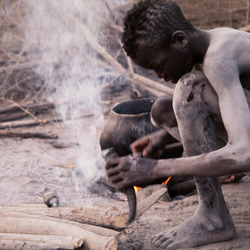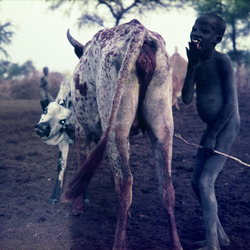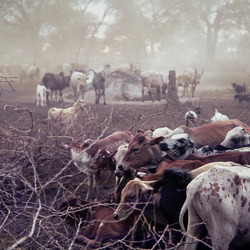Livestock 19
Livestock is not as important for food as it is for investment and saving, realizable in bride wealth for wives, converted into prestige, or to cash through sale. Bride wealth is high—five cows given in the name of the father and five in the name of the brother, one bull to the eldest brother of the girl, one bull to the eldest brother of her father, and a goat to the eldest sister of her father. And spears and hoes and small stock. These animals are not given at once but stay as claims over years, and are realized as support for bride wealth for relatives when needed. A younger sister’s future marriage and even the marriage of an unborn daughter, can be used in negotiating bride wealth. Livestock is ‘owned’ by individuals, but has claims from relatives, both affinal and of one’s own lineage.
When slaughtered, livestock is consumed collectively as sacrifice in a ceremonial context. Such ceremonies are organized by lineage segments and stating the unity of kinship groups. Smallstock can also be used as payment, for instance for a special job done by an age group.
Only a few cows are milked, and then less than one liter every morning and evening. The milk is given to the calves and the shepherds. Milk is given to children in need and to people who may need it because of sickness.
Dry season cattle camps
During the rainy season and the
beginning of the dry season (June – December), the livestock are kept
inside the villages at night and pastured nearby during the day. The
rest of the year, the livestock are moved to cattle camps near Kenatty
river about 15 km southwest of the Lafon. Boys from 6 to 10 years old
live in the cattle camps and herd the livestock during the day and guard
them from predators at night. They get up early in the morning shaking
milk from the day before into butter. They then milk and let the cows
out before fetching water, cooking and eating. Later, calves, goats and
sheep are let out of the stables. In the early afternoon, the animals
return from the riverside. Because of the presence of flies, big stock
are not let into the stables before sunset.
A cool current from the nearby swamp and river makes the nights cold. The boys sleep on warm ashes and during the night, and those who wake up spread more warm ashes, and help their friends roll over to the heated ground. Their bodies become covered in ash, which helps prevent bites from mosquitos.
